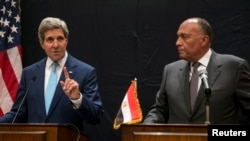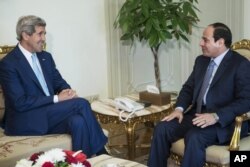CAIRO —
U.S. Secretary of State John Kerry visited Cairo on the first leg of a trip through a region increasingly worried by the sectarian conflict in Iraq.
One of Kerry’s key messages during his tour is inclusion, both by the government in Iraq and in Egypt.
Speaking Sunday in Cairo, Kerry warned of the dangers of Sunni extremists making gains against the Shi’ite-led government in Baghdad. But he added a plea to the country’s leaders.
“This is a critical moment where we must urge Iraq's leaders to rise above sectarian motivations and form a government that is united in its determination to meet the needs and speak to the demands of all of their people,” Kerry said.
Kerry is the highest-ranking U.S. official to visit Egypt since el-Sissi, the former military leader who toppled Islamist President Mohamed Morsi after mass protests last year, won a presidential election in May.
The unannounced stop in Cairo, which included a meeting with el-Sissi, came at the start of a hastily arranged tour of the Middle East and Europe.
While Kerry said it is up to the Iraqi people to decide who their leaders will be, the top U.S. diplomat is expected to discuss the formation of a more inclusive Iraqi government during the various stops on his trip.
But, he stressed, the U.S. is not engaged in choosing or advocating for any one individual or series of individuals for the Iraqi leadership.
Threat to region
Kerry also said the militants’ ideology is a threat not only to Iraq’s government, but to the entire region.
At a news conference with Egyptian Foreign Minister Sameh Shoukry, Kerry pointed to Washington and Cairo’s “long-standing and deep partnership” and said the two would work together to counter terrorist threats.
But he acknowledged both sides “have things we can do better” and called for upholding universal rights of free speech and free assembly.
Relations between Washington and Cairo were strained by the overthrow of Egypt’s first freely elected president, Morsi, and the ensuing crackdown on the Muslim Brotherhood, from which Morsi hails.
Kerry’s visit comes a day after an Egyptian court confirmed death sentences against 183 members of Morsi's Muslim Brotherhood, including its leader Mohamed Badie, in a mass trial on charges of violence in which one policeman was killed.
A senior official traveling with Kerry was quoted as saying the U.S. does not agree with the Egyptian government’s view the Brotherhood is linked to terrorist groups.
The official called the situation more of a political challenge than a security one.
Speaking shortly after his arrival, Kerry alluded to Egypt’s deep divisions.
"This is a critical moment of transition in Egypt,” he said. “The United States is very interested in working closely with President el-Sissi in order to help make this transition as rapidly and smoothly as possible."
U.S. officials acknowledged they were "balancing" different strategic interests in what is a "complicated" relationship with Egypt.
“They in some ways are radicalizing certain aspects of Egyptian society in ways that are not supportive of overall stability in Egypt,” said the official, who briefed reporters en route to Cairo, and was reported by Reuters.
Still, the official said there had been “a few flickering signs of positive movement” in recent weeks.
Among these was the release of an Al Jazeera journalist, steps to start addressing sexual violence against women and el-Sissi's call during his first cabinet meeting for the revision of the human rights law.
US influence waning
But it is unclear how much clout the United States has in Egypt, and in the region, after the fallout from its invasion of Iraq, and what many here consider Washington's mistakes during the Arab Spring uprisings and their aftermath.
Political Sociologist Said Sadek of the American University in Cairo says while the United States remains an important player that cannot be ignored, Kerry comes at a time when America has lost a lot of trust among Arab leaders.
"Egyptians distrust them because of their support of Morsi,” Sadek said. “The Saudis are also not enthusiastic about Obama. He failed them in going forward in the Syrian campaign. Also they blame him for what is happening in Iraq.
“Everybody is blaming America for what is happening in Iraq,” Sadek added.
It is a view that makes Kerry’s job to help find solutions more difficult, when his country is considered the source of many of the problems.
During his Middle East tour, Kerry is also discouraging Arab nations from sending financial support to even moderate opposition Sunni groups in Syria, fearing the aid could be used to help the growing insurgency in Iraq.
Kerry said he delivered that message to el-Sissi during their meeting Sunday in Cairo, adding that he plans to make the same case to other leaders in Sunni-dominated Arab states over the next several days.
He said he will urge Arab states to work together to defeat the Islamic State of Iraq and the Levant (ISIL) militants.
Also Sunday, U.S. officials revealed that $572 million (420 million euros) of U.S. aid, which had been frozen since October, was released to the Cairo government about 10 days ago after finally winning a green light from Congress.
The funds will mainly go to pay existing defense contracts, including 10 Apache helicopter gunships for counterterrorism efforts in the Sinai Peninsula.
Kerry said he was "confident" Egypt would receive Apache gunships soon. But the aircraft remain in storage in the U.S., an official had confirmed Sunday.
Some information for this report provided by Reuters and AFP.
One of Kerry’s key messages during his tour is inclusion, both by the government in Iraq and in Egypt.
Speaking Sunday in Cairo, Kerry warned of the dangers of Sunni extremists making gains against the Shi’ite-led government in Baghdad. But he added a plea to the country’s leaders.
“This is a critical moment where we must urge Iraq's leaders to rise above sectarian motivations and form a government that is united in its determination to meet the needs and speak to the demands of all of their people,” Kerry said.
Kerry is the highest-ranking U.S. official to visit Egypt since el-Sissi, the former military leader who toppled Islamist President Mohamed Morsi after mass protests last year, won a presidential election in May.
The unannounced stop in Cairo, which included a meeting with el-Sissi, came at the start of a hastily arranged tour of the Middle East and Europe.
While Kerry said it is up to the Iraqi people to decide who their leaders will be, the top U.S. diplomat is expected to discuss the formation of a more inclusive Iraqi government during the various stops on his trip.
But, he stressed, the U.S. is not engaged in choosing or advocating for any one individual or series of individuals for the Iraqi leadership.
Threat to region
Kerry also said the militants’ ideology is a threat not only to Iraq’s government, but to the entire region.
At a news conference with Egyptian Foreign Minister Sameh Shoukry, Kerry pointed to Washington and Cairo’s “long-standing and deep partnership” and said the two would work together to counter terrorist threats.
But he acknowledged both sides “have things we can do better” and called for upholding universal rights of free speech and free assembly.
Relations between Washington and Cairo were strained by the overthrow of Egypt’s first freely elected president, Morsi, and the ensuing crackdown on the Muslim Brotherhood, from which Morsi hails.
Kerry’s visit comes a day after an Egyptian court confirmed death sentences against 183 members of Morsi's Muslim Brotherhood, including its leader Mohamed Badie, in a mass trial on charges of violence in which one policeman was killed.
A senior official traveling with Kerry was quoted as saying the U.S. does not agree with the Egyptian government’s view the Brotherhood is linked to terrorist groups.
The official called the situation more of a political challenge than a security one.
Speaking shortly after his arrival, Kerry alluded to Egypt’s deep divisions.
"This is a critical moment of transition in Egypt,” he said. “The United States is very interested in working closely with President el-Sissi in order to help make this transition as rapidly and smoothly as possible."
U.S. officials acknowledged they were "balancing" different strategic interests in what is a "complicated" relationship with Egypt.
“They in some ways are radicalizing certain aspects of Egyptian society in ways that are not supportive of overall stability in Egypt,” said the official, who briefed reporters en route to Cairo, and was reported by Reuters.
Still, the official said there had been “a few flickering signs of positive movement” in recent weeks.
Among these was the release of an Al Jazeera journalist, steps to start addressing sexual violence against women and el-Sissi's call during his first cabinet meeting for the revision of the human rights law.
US influence waning
But it is unclear how much clout the United States has in Egypt, and in the region, after the fallout from its invasion of Iraq, and what many here consider Washington's mistakes during the Arab Spring uprisings and their aftermath.
Political Sociologist Said Sadek of the American University in Cairo says while the United States remains an important player that cannot be ignored, Kerry comes at a time when America has lost a lot of trust among Arab leaders.
"Egyptians distrust them because of their support of Morsi,” Sadek said. “The Saudis are also not enthusiastic about Obama. He failed them in going forward in the Syrian campaign. Also they blame him for what is happening in Iraq.
“Everybody is blaming America for what is happening in Iraq,” Sadek added.
It is a view that makes Kerry’s job to help find solutions more difficult, when his country is considered the source of many of the problems.
During his Middle East tour, Kerry is also discouraging Arab nations from sending financial support to even moderate opposition Sunni groups in Syria, fearing the aid could be used to help the growing insurgency in Iraq.
Kerry said he delivered that message to el-Sissi during their meeting Sunday in Cairo, adding that he plans to make the same case to other leaders in Sunni-dominated Arab states over the next several days.
He said he will urge Arab states to work together to defeat the Islamic State of Iraq and the Levant (ISIL) militants.
Also Sunday, U.S. officials revealed that $572 million (420 million euros) of U.S. aid, which had been frozen since October, was released to the Cairo government about 10 days ago after finally winning a green light from Congress.
The funds will mainly go to pay existing defense contracts, including 10 Apache helicopter gunships for counterterrorism efforts in the Sinai Peninsula.
Kerry said he was "confident" Egypt would receive Apache gunships soon. But the aircraft remain in storage in the U.S., an official had confirmed Sunday.
Some information for this report provided by Reuters and AFP.












